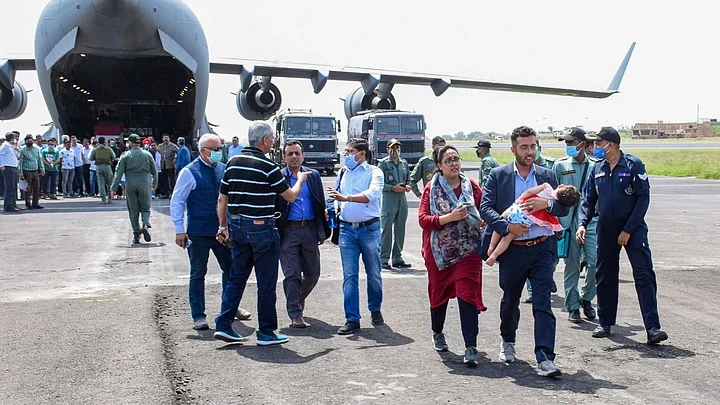Since the Taliban took control of the Afghanistan capital Kabul on Sunday, 15 August, India’s priority has been to safely get its nationals out of there.
As per an article on The Quint from last week, before Kabul fell and the Afghan government abdicated its charge, there were less than 300 Indians in Afghanistan.
Since then, around 100 Indians have returned via commercial flights and another 45 Indians, junior staff members at the Indian Embassy, returned on Tuesday night by a special aircraft.
On Tuesday, 100 Indians, including Rudrendra Tandon, India’s Ambassador to Afghanistan, were evacuated from Kabul aboard an Indian Air Force aircraft, which had been stationed in the former Indian Air Force base at Ayni, in Tajikistan, near the Afghan border, since Sunday.
"In view of the prevailing circumstances, it has been decided that our Ambassador in Kabul and his Indian staff will move to India immediately," External Affairs Ministry Spokesperson Arindam Bagchi tweeted.
The Prime Minister's Meet
Tandon joined Foreign Secretary Harsh Shringla on Tuesday evening to brief the Cabinet Committee on Security (CCS) about the situation on the ground in Afghanistan.
The CCS meeting, chaired by Prime Minister Narendra Modi, included the National Security Advisor and Union ministers of home affairs, defence, and finance along with senior security and intelligence officials.
They discussed the situation in Afghanistan and strategised on the next steps the Indian government should take to deal with the crisis after the very rapid capitulation of Afghanistan to the Taliban.
The first priority is to evacuate all Indian citizens swiftly and safely. At this point, there are around 50 Indians still waiting to return home, most with private companies and contractors.
The next category of those who will be assisted out of Afghanistan are the Hindu and Sikh community members, who are Afghan citizens and, as a concession to the very difficult changed circumstances since the Taliban takeover, all Afghans who wish to come to India.
At this juncture, it is unclear what these numbers might be as the Taliban assumed power just two days ago and the situation on the ground is very fluid.
While the government “is committed to the safe return of all Indian nationals and will institute flight arrangements once Kabul airport is open,” the major problem is the operational status of Kabul airport.
Sources said an IAF aircraft has been stationed at Ayni to swiftly move to evacuate the remaining Indians, as soon as possible.
E-Visas and Refuge to Afghan Hindus, Sikhs?
The Ministry of Home Affairs (MHA), meanwhile, announced a new category of electronic visas to fast-track applications of Afghans who want to come to India, in view of the prevailing situation in Afghanistan.
The MHA said it reviewed visa provisions "in view of the current situation in Afghanistan" and has launched an "e-Emergency X-Misc Visa" to fast-track applications.
All Afghans can apply for such visas, which will be scrutinised in Delhi. Eligible people will be granted visas for a six-month period initially.
This is an interesting development given that the government enacted the Citizenship (Amendment) Act (CAA) in December 2019 in which it specifically singled out three countries, Afghanistan, Bangladesh, and Pakistan, as countries where minorities face torture, thereby necessitating easier ways for them to seek refuge and asylum in India.
Provisions of the CAA had ensured that India was not high on the list of countries to which Afghans, earlier, were seeking refuge.
“We have already received requests from Afghan Sikh and Hindu community leaders, and are in touch with them,” Bagchi said, adding that, “As regards to Afghan nationals, our visa services will continue through an e-emergency visa facility, which has been extended to Afghan nationals.”
These emergency guidelines have been framed to ensure that many Afghans who have assisted the Indian development effort in Afghanistan, a vast majority of whom are Muslim, along with their families can come to India, particularly if they face a threat to their lives.
It also helps that laws have not yet been framed to operationalise the CAA.
Bagchi noted that “the situation in Afghanistan is being monitored on a constant basis at high levels. The government will take all steps to ensure the safety and security of Indian nationals and our interests in Afghanistan."
After thanking the Indian Air Force that "flew us out under conditions that are not normal," Tandon said officials were "continuously monitoring the situation" and said Indians still stuck in Afghanistan would be brought back.
The biggest problem currently facing evacuation efforts is the fact that Kabul airport is closed and flying over Afghan airspace is difficult, without express permission and assistance.
Even the evacuation of the Indian envoy and senior Embassy staffers was fraught with challenges because the Taliban appeared very interested in what the Indian diplomats were doing, an official who returned said.
Since the US forces have taken control of the airport, the Taliban is closely watching all those, particularly foreigners, who are trying to reach the airport to leave the country.
(Nilova Roy Chaudhury, a senior journalist, is Consulting Editor with India News Stream and a Senior Fellow with think tanks WISCOMP (Women in Security, Conflict Management and Peace) and Society for Policy Studies.)
